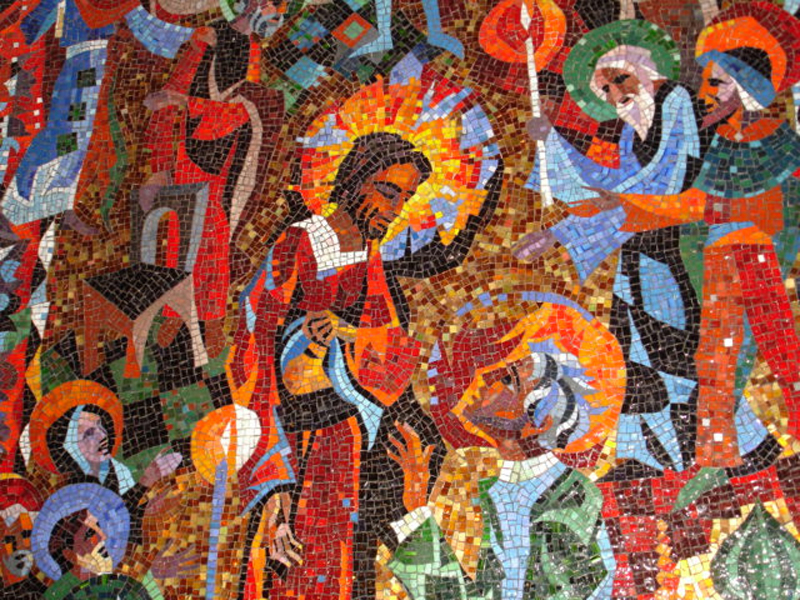Revised Common Lectionary Reflection, Second Sunday of Easter, Year B
April 11, 2021

Lessons: Acts 4:32-35; Psalm 133; 1 John 1:1-2:2; John 20:19-31
Theme: God’s faithful and generous people have come to believe by faith and the witness of the first disciples.
Key Scripture: Jesus said to [Thomas], “Have you believed because you have seen me? Blessed are those who have not seen and yet have come to believe.” – John 20:29
The gospel lesson for the Second Sunday of Easter reminds us that seeing does not necessarily result in believing, and believing does not always involve seeing. Jesus’ closest disciples are still locked away in a house in Jerusalem. They are afraid that the religious authorities will find them and see that they are punished, too. Yes, the seeds of both faith and doubt have been sown with the news that Mary, Mary Magdalene, and Salome have finally shared with the others. I’m sure the disciples wanted to believe that Jesus was risen and on the loose, but evidently something about Jesus looked different and folks were having a little trouble with recognition. In fact, it evidently wasn’t his physical appearance wherein they found their Lord but rather in his signs, wonders, and presence.
Jesus walks through the locked door to give his beloved companions exactly what they need—an extra inoculation of faith for most, and a dose of doubt for another one. Somehow the risen Christ uses breath and words of peace/greeting to help his follows see what they so desperately want to believe. He breathes the gift of the Holy Spirit upon them and gives them the power to forgive sins in his name, something bestowed upon ministers and priests at their ordination. Seeing and hearing Jesus is enough to kick-start the fragile faith of the ones who are there for Jesus’ first visit.

Thomas must have been out gathering provisions or testing the political temperature in Jerusalem. Whatever he was doing, he misses out on Jesus’ visit and gift of the Spirit. Thomas needs to see for himself, a perfectly normal human reaction, and Jesus meets Thomas at his place of need. Not only does Thomas see the risen Lord, he is invited to put his fingers in Christ’s wounds, to witness the messiness of doubt, belief, and discipleship.
Thankfully, for us today, believing is much more than seeing. We did not personally witness the events of Holy Week, nor were we present at the empty tomb or at any of Jesus’ post-resurrection encounters. In John 20:29, Jesus says to Thomas, “Have you believed because you have seen me? Blessed are those who have not seen and yet have come to believe.” Yes, the faithful witness of those disciples and the fact that they eventually left that locked room and transmitted their experiences to future generations help the Christ meet us at our intersections of faith and doubt.
Belief in the Christ comes through story and tradition, by others committing to raise us in the faith and teach us those stories, and through the gift of the Holy Spirit in baptism. Does that mean that faith is an easy-peasy linear experience? Perhaps for a few, but for most of us it takes the pain and hardship of life to serve as a crucible for that faith. Doubt is equally as important as belief, and most of us dance between the two boundaries of faith even if we are loath to admit it.
In fact, because the risen Christ continues to meet us right at our point of need, the faith that struggles is just as valid as the faith that seems built on solid rock. There will be messiness, sadness, betrayal, suffering, doubt, despair, and loss; Jesus is intimately acquainted with these emotions. There is nowhere your mind, heart, or body can go that Jesus does not know. He will always be there to meet you. All that’s required of you is to ask for what you need—Thomas did—and to pay attention to the signs of the risen Christ all around you. Love God, love neighbor, and love yourself so that you can love others and share the good news of the Christ.
In Worship
Sometimes celebrating faith means laughing in the face of the powers of death and destruction. After all, Easter reminds us that these powers have no control over us thanks to the risen Christ. Consider practicing Holy Humor Sunday and including appropriate jokes and perhaps even ask people to dress in crazy hats or outfits. Jesus did weep, but he also laughed, and so should we Christians. Click here for more information about this practice.
With Youth
If you meet with your youth this week, consider talking about the epistle lesson (1 John 1:1-2:2). In the Lutheran traditional liturgy, part of our weekly Confession and Forgiveness contains words from this passage. Other traditions may have a more implicit understanding of confession, but nonetheless these words remind us of why confession is important and how a statement of forgiveness offered on Jesus’ behalf is powerful and healing.
Consider also using this Rob Bell quote from What We Talk About When We Talk About God as a discussion starter: “Confession is like really, really healthy vomit. It may smell and get all over the front of your shirt, but you feel better—you feel cleansed—when you’re done.”
With
Children
This week’s focus verse is Acts 4:32 – Now the
whole group of those who believed were of one heart and soul, and no one
claimed private ownership of any possessions, but everything they owned was
held in common.
How many of you like to share your toys? (Accept all answers and affirm the children.) Sometimes it’s easy to share, especially if you’re sharing with a friend or someone you trust. It can also be hard to share if you’re not sure the person with whom you’re sharing will truly care for your toys and will return them. You can either “have faith” that sharing will be okay, or you can doubt that sharing will turn out well.
Clearly the Christians in this week’s lesson from Acts had learned to “have faith” that sharing would turn out okay. I wonder if this was because they had come to have faith in Christ? Jesus taught his followers to be loving, kind, and generous. If we have faith in Jesus, we may find it easier to share.
It’s okay to doubt that sharing will turn out well. In fact, it’s okay to doubt your faith and belief because Jesus always meets us exactly where we need him to meet us. Our job is to pay attention and walk through this world expecting to see signs of Jesus everywhere. Once we learn to see Jesus in our neighbor, it becomes a lot easier to share and trust.
If sharing is hard for you, don’t give up. Keep looking to Jesus, and he will help you have the faith you need to be loving, kind, and generous—to share both your toys and the good news of Jesus’ love.
Finish with a simple echo prayer and blessing.
Dear God (Dear God),
Thank you (Thank you) for loving us (for loving us). Thank you for teaching us (Thank you for teaching us) to be loving, kind, and generous (to be loving, kind, and generous). Thank you for teaching us (Thank you for teaching us) to have faith (to have faith). We love you, God (We love you, God). Help us to tell others (Help us to tell others) about the amazing good news of Jesus (about the amazing good news of Jesus). And let all God’s children say Amen (Amen)!
Weekly
Stewardship Bulletin Insert
It may take time to see the results of our careful
stewardship. The one who plants a seedling must wait for the tree to grow, and
ministries and mission don’t often simply pop up overnight. They take planning,
investment, and follow through. Thank you for sowing seeds with your time,
talent, and resources that will one day bear much fruit.
Stewardship at Home
“Take faith, for example. For many people in our world, the opposite of faith is doubt. The goal, then, within this understanding, is to eliminate doubt. But faith and doubt aren’t opposites. Doubt is often a sign that your faith has a pulse, that it’s alive and well and exploring and searching. Faith and doubt aren’t opposites, they are, it turns out, excellent dance partners.” – Rob Bell
What do you need to balance your doubt and faith? After all, believing is much more than simply seeing. Jesus makes that clear in this week’s gospel lesson. If you haven’t read Rob Bell’s book What We Talk About When We Talk About God, consider spending time with the book this week. Here’s a podcast that you may find intriguing. Try journaling about your experiences with faith and doubt, with seeing and not seeing.
2018 Reflection: https://www.stewardshipoflife.org/2018/04/finding-unity-in-christ/
2015 Reflection: https://www.stewardshipoflife.org/2015/04/signs-wonders-movement-making/
2012 Reflection: https://www.stewardshipoflife.org/2012/04/impossible-dream-or-resurrection-reality/
Note: Reprint rights granted to congregations and other church organizations for local, nonprofit use. Just include this note: “Copyright (c) 2021, Rev. Sharron Blezard. Used by Permission.”



Leave a Reply